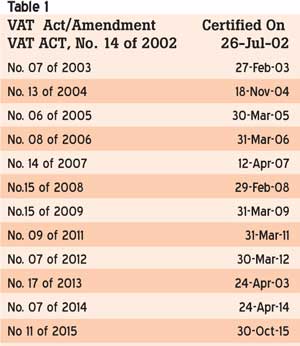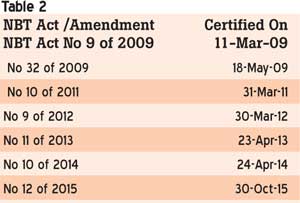20 Jul 2016 - {{hitsCtrl.values.hits}}
 A study of the history reveals that the implementation of tax changes pursuant to the publication of press notices and subsequent legislative enactment of the same with retrospective effect seem to be the norm rather than the exception in Sri Lanka.
A study of the history reveals that the implementation of tax changes pursuant to the publication of press notices and subsequent legislative enactment of the same with retrospective effect seem to be the norm rather than the exception in Sri Lanka.
A comparison of the dates of commencement of implementation of the value-added tax (VAT) changes and the certification of the Amendment Act by the Speaker of Parliament, the latter date being the date of enactment of the law, it could be observed that every single amendment in the history from 2003 has been implemented with the legal Amendment Act being enacted subsequently with retrospective effect. During the interim period, the relevant change in VAT law has been in operation due to administrative press notice sans any legal sanction.
Every year, the annual budget proposals have been presented generally in November (or thereabout) in parliament. The budget proposals to change import levies have been normally implemented from the midnight of the day of the budget whereas the VAT and Nation Building Tax (NBT) proposals implemented from the first of January of the immediately following year from the date of reading of the budget proposals.
 The implementation of the budget proposals pertaining to income tax and economic service charge has been from the beginning of the new fiscal year immediately after the budget. i.e. from the first day of April immediately after the annual budget. (Though the aforesaid represents the dates of implementation for majority of the changes, a scrutiny would reveal certain changes have been given retrospective impact on ad hoc basis too. For example, by way of Amendment Act No 13 of 2004 (certified on November 18, 2004), Section 7 of the VAT Act was amended to identify the supply of any goods imported into Sri Lanka for the purpose of re-export under entre-port trade, as Zero rated. However, this amendment to Section 7 was granted retrospective effect from July 1, 2003.)
The implementation of the budget proposals pertaining to income tax and economic service charge has been from the beginning of the new fiscal year immediately after the budget. i.e. from the first day of April immediately after the annual budget. (Though the aforesaid represents the dates of implementation for majority of the changes, a scrutiny would reveal certain changes have been given retrospective impact on ad hoc basis too. For example, by way of Amendment Act No 13 of 2004 (certified on November 18, 2004), Section 7 of the VAT Act was amended to identify the supply of any goods imported into Sri Lanka for the purpose of re-export under entre-port trade, as Zero rated. However, this amendment to Section 7 was granted retrospective effect from July 1, 2003.)
The Value Added Tax Act No 14 of 2002, the Principal Act was certified by the Speaker of Parliament on July 26, 2002 and the Act was implemented with effect from August 1, 2002. Thereafter the first amendment to the VAT Act was introduced by the Amendment Act No. 7 of 2003, which was certified by the Speaker only on February 27, 2003, a lapse of near two months from the date of implementation, i.e., January 1, 2003. The first set of changes to the VAT law was implemented with a mere press notice without the Amending Act being enacted in parliament. The first legal amendment to the VAT Act was introduced with retrospective effect thereafter. This practice of implementing changes with mere press notices and thereafter the amending Acts being enacted with retrospective effect continued in every single year from 2003 to 2015 (altogether 12 years except 2010 where no amending Act was introduced) as reflected in Table 1.
This practice adopted, though in violation of the Article 148 of the Constitution of Sri Lanka was never challenged by anyone in the past years. The relevant part of the Article 148 of the Constitution reads as follows.
“Parliament shall have full control over public finance. No tax, rate or any other levy shall be imposed by any local authority or any other public authority, except by or under the authority of a law passed by parliament or of any existing law.”
 The rule
The rule
The rule that in the absence of a law passed by parliament taxes cannot be imposed has been observed in breach during the past not only in the realm of the VAT but in the case of other types of taxes too. For instance, though the budget proposals pertaining to NBT have been implemented from January 1 every year, the dates of certification of the Amending Nation Building Tax Statutes from the year 2009 reveal that there have always been ‘interim periods’ where respective NBT changes have been in operation without the relevant amendment being passed by parliament.
For instance, though the NBT changes proposed for 2011 in the annual budget speech delivered in 2010 were implemented with effect from January 1, 2011, the relevant NBT amending Act was certified only on March 31, 2011. During the interim period the changes were notified to the public via a press notice and implemented, the NBT Amendment Act No 10 of 2011 was certified with retrospective effect. This practice could be observed in the other NBT amendments in the subsequent years as well.
It is also pertinent to note that the Article 75 of the Constitution of Sri Lanka empowers parliament to enact retrospective legislation.
Article 75 of the Constitution reads, “Parliament shall have power to make laws including laws having retrospective effect and repealing or amending any provision of the Constitution or adding any provision to the Constitution:
Provided that parliament shall not make any law
(a) Suspending the operation of the Constitution or any part thereof, or
(b) Repealing the Constitution as a whole unless such Law also enacts a new constitution to enact it.”
Hence, it is clear that parliament has the power to enact retrospective tax laws (Though the process is legal, retrospective tax laws are shun in every part of the world. The process subjects tax payers to much inconvenience. A case in point is the retrospective enactment of the Land (Restrictions on Alienation) Act No.38 of 2014 with effect from January 1, 2013 but which was certified by the speaker only on October 29, 2014. Prior to such certification Land Lease Tax was collected by authorities by virtue of a mere administrative notice).
The practice of implementing tax changes with press notices, which is an inherent part of tax culture of Sri Lanka, was challenged in the courts, perhaps for the first time in Sri Lanka recently with regard to implementation of VAT and NBT changes from May 2, 2016, without the enactment of relevant amending statutes. The three-judge bench of the Supreme Court by an Interim Order on July 11, 2016 suspended the notices issued by the authorities, to administratively implement the VAT and NBT changes with effect from May 2, 2016.
This fact of the suspension of the notices by the Supreme Court has been acknowledged by the authorities in a subsequent notice published dated July 12, 2016. The respective VAT and NBT rules that should be followed by the tax payers, therefore are the rules couched in the Value Added Tax Act No 14 of 2002 as last amended by the Amending Act no 11 of 2015 and the Nation Building Act No 9 of 2009 as last amended by the Amending Act No 12 of 2015.
Law in operation
As such, until further legal amendments are introduced to the aforesaid two Acts, the following continue to be the law in operation in the relevant areas addressed by the suspended notices.
At this juncture, it is important to appreciate that due to the tax culture that prevailed in the country for many years, that many tax payers with effect from May 2, 2016 have followed the instructions that were published in the suspended notices. As a result, the following are some of the challenges that have to be addressed by the tax authorities and tax payers.
a) VAT registered suppliers have issued VAT invoices at the rate of 15 percent to the VAT registered recipients and collected payments accordingly.
b) VAT registered suppliers have issued VAT inclusive invoices to recipients who are not registered for VAT and collected VAT inclusive consideration.
c) Companies/persons engaged in telecom, healthcare and whole and retail sellers whose supplies are within the range of Rs.100 million/3 million per quarter may have issued VAT invoices/VAT inclusive invoices at 15 percent and collected VAT accordingly.
d) VAT has been paid at 15 percent to the Director General of Customs for imports and received the Custom Declaration accordingly.
e) The complications in filing and payment of VAT and NBT due to the notices.
The policymakers have the challenge of resolving the aforesaid complexities with minimal inconvenience for all parties concerned whilst salvaging the national economy in the context of the predicament it is in due to shortage of tax revenue and debt burden.
The judicial intervention to halt the culture of implementation of taxes via notices, perhaps was an unexpected event in the context of the past practices which prevailed for a period spanning beyond a decade. This is indeed a red flag to be extra vigilant in ensuring tax legislations are enacted prior to implementation and may be a ‘full stop’ for more than a decade-old tax culture of enforcement of taxes via administrative notices.
(Suresh R.I. Perera LLB, Attorney-at-Law, FCMA, CGMA in Principal, Tax and Regulatory at KPMG)
10 Jan 2025 6 minute ago
10 Jan 2025 2 hours ago
10 Jan 2025 2 hours ago
10 Jan 2025 3 hours ago
10 Jan 2025 4 hours ago